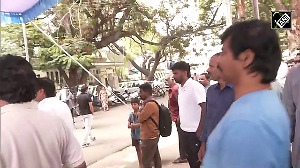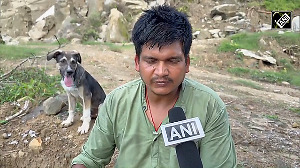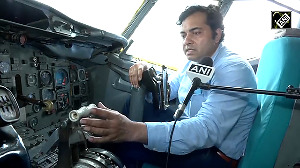'I am a vegetarian and nobody can force me to eat meat.'
'It is my personal right to decide what I eat.'
'Similarly, telling a person who eats non-vegetarian food not to eat beef is a human rights violation.'
Illustration: Uttam Ghosh/Rediff.com
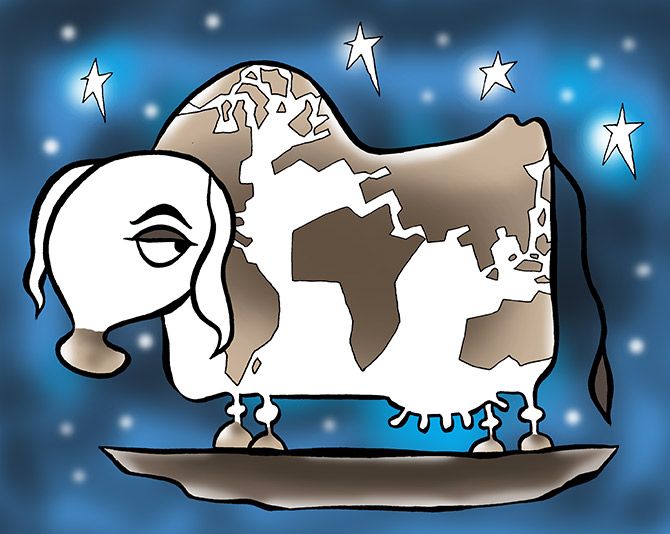
When the Centre introduced a new notification banning the sale of cattle for slaughter in animal markets, S Selvagomathy, a vegetarian, decided to challenge it in court.
The Madurai-based lawyer-activist and managing trustee of the Justice Shivaraj V Patil Foundation for Social Legal Education and Development, tells Rediff.com's Shobha Warrier why the new rule violates human rights.
You are the first person to file a petition in the Madras hHigh court against the rule framed by the Centre banning the sale of cattle for slaughter in animal markets.
The court has ordered an interim stay.
Why do you feel the new rule violates human rights?
It is my personal right to eat what I want, and I feel this rule infringes upon my right to eat.
The State entering the kitchen and the dining table itself is a human rights violation, according to me.
The very fact that an issue that should have been decided and talked about inside the kitchen is being discussed and debated out in the open, is a human rights violation.
I am a vegetarian and nobody can force me to eat meat; it is my personal right to decide what I eat.
Similarly, telling a person who eats non-vegetarian food not to eat beef or something else is a human rights violation.
Nobody, not even the State, has the right to interfere in the personal rights of a person.
According to the animal rights activist Gauri Maulekhi, based on whose petition this rule was formed by the Centre, the rule does not curb people's eating habits, it only bans cattle being sold in the markets.
My question is: Why is cattle sold in the marketplace? Why do people buy cattle at the market?
We all know that they are not bought to rear in the farms.
Is it not to slaughter them?
Why are they slaughtered? For people to eat.
Does that not mean, by banning the sales of cattle in the market, they are violating human rights, the rights of human beings to eat what they want?
Already in the northern part of India, many meat stalls are forcibly closed which would have affected all those involved in the business and those who eat meat.
Do you feel the BJP is trying to impose its ideology which suited the northern belt in the other parts of India too?
Let me say that food depicts the culture of a community; it shows its history.
Some communities eat a particular kind of food which other communities may not eat.
It is not for the government to decide what a community should eat and what it should not.
Ours is a secular country where people belonging to many religions and castes live.
Like we speak different languages, we also eat different types of food.
The Constitution guarantees each one of us the right to speak our language and the right to eat our food; it is part of our right to live.
Is it not the duty of the government to see that each Indian gets the right the Constitution promises?
Animal activists say that all over the world, cattle are bought by slaughter houses directly from the farmers and not at market places.
Also, they say that animals are tortured when they are transported from one place to another?
If you go to a village, you will see that animals are treated as part of the family by all farmers.
They name the animals Lakshmi, Mahalakshmi, etc, because they are not just animals to the farming community, they are more like their own children.
You should understand that they sell these animals only because they cannot feed them.
When they cannot feed their own children, it is a burden on their part to feed the animals too.
If they could afford it, no farming family will sell their animals.
After they sell these animals, they don't even eat for a week.
You would be punishing the farmers by imposing restrictions on the sales of cattle.
Do you know why there are so many middlemen involved in the sales of cattle?
Only if you have documents showing permission from the authorities can you sell them.
Many farmers find it hard to obtain the documents as most of them are illiterate.
That is the reason middlemen do this job and buy cattle from the farmers.
Just imagine the situation 100 or 50 or even 10 years ago.
If you tell your grandparents that eating beef is a big issue now and selling our cattle is a big problem, they would not believe you.
Everything was so simple and issues like this did not exist 50 years ago.
Were the farmers not rearing cows and other animals, and selling them later?
Were we not eating meat then?
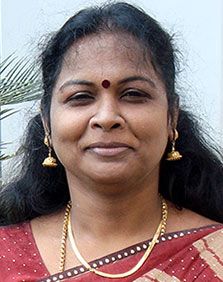
While the Madras high court put the order on hold, the Kerala high court was of the opinion that the order did not ban cow slaughter.
What do you have to say about these two different points of view?
The Kerala high court may be of the opinion that the order did not ban cow slaughter, but to our understanding, this order violates human rights, the right to eat.
In fact, we feel this (government) order violates the right to eat, the right to profession, the right to live, the right to worship and the right to livelihood.
That was why we went to court. While we got an interim order staying the rule, the Kerala high court did not feel that way. We do not know how the lawyers fought the case there.
Do you feel the country has been polarised between vegetarian and non-vegetarian, beef eaters and non-beef eaters?
Why should there be a conflict between one versus the other when the Constitution guarantees the right to live to all citizens?
There shouldn't be a conflict like this in a country like ours because both vegetarians and non-vegetarians are Indian citizens.
We are fighting the case so that such conflicts do not occur in future.
It is not my fight alone; so many of us have come together to fight it, and we will fight it legally till the government withdraws the order.









